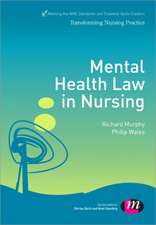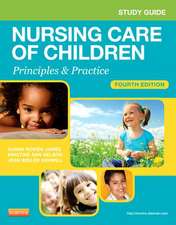Communication in Nursing and Healthcare: A Guide for Compassionate Practice
Autor Iris Gault, Jean Shapcott, Armin Luthi, Graeme Reiden Limba Engleză Hardback – 31 oct 2016
Key features include:
* students' experiences and stories from service users and patients to help readers relate theory to practice
* reflective exercises to help students think critically about their communication skills
* learning objectives and chapter summaries for revision
* interactive activities directly linked to the Values Exchange Community website
| Toate formatele și edițiile | Preț | Express |
|---|---|---|
| Paperback (1) | 238.14 lei 3-5 săpt. | +14.20 lei 4-10 zile |
| SAGE Publications – 31 oct 2016 | 238.14 lei 3-5 săpt. | +14.20 lei 4-10 zile |
| Hardback (1) | 664.91 lei 6-8 săpt. | |
| SAGE Publications – 31 oct 2016 | 664.91 lei 6-8 săpt. |
Preț: 664.91 lei
Preț vechi: 699.91 lei
-5% Nou
Puncte Express: 997
Preț estimativ în valută:
127.23€ • 133.18$ • 105.90£
127.23€ • 133.18$ • 105.90£
Carte tipărită la comandă
Livrare economică 31 martie-14 aprilie
Preluare comenzi: 021 569.72.76
Specificații
ISBN-13: 9781473926691
ISBN-10: 1473926696
Pagini: 192
Dimensiuni: 170 x 242 x 16 mm
Greutate: 0.48 kg
Ediția:First Edition
Editura: SAGE Publications
Colecția Sage Publications Ltd
Locul publicării:London, United Kingdom
ISBN-10: 1473926696
Pagini: 192
Dimensiuni: 170 x 242 x 16 mm
Greutate: 0.48 kg
Ediția:First Edition
Editura: SAGE Publications
Colecția Sage Publications Ltd
Locul publicării:London, United Kingdom
Recenzii
'Gault et al have grasped the nettle of the impact of burnout, desensitisation, Francis and Winterbourne View on healthcare and offer a comprehensive toolkit of skills to breathe the fresh air of compassionate communication back into practice. I heartily recommend this text to all healthcare students and seasoned professionals alike.'
‘Finally we have a book which comprehensively supports nursing students in gaining a sophisticated understanding of communication in healthcare. This book enables nurses to truly make a difference to the lives of healthcare users and will impact positively on lifelong professional working.’
'This book is a comprehensive, evidence-based, handbook for modern healthcare practitioners. Its practical approach ensures key skills are addressed. Informed by shared experiences of healthcare practice and authors' expertise, the reader is provided with an essential toolkit for developing a holistic, reflective, sensitive, value based approach to communicating in health care.'
'This is an excellent guide for students which demonstrates the important role of communication in delivering compassionate, dignified and respectful care. It will support the student to develop from novice communicator to leaders in care.'
'This book is an important resource for all those involved in the teaching of communication skills. Its approach incorporating theory along with exercises and nurse practice exemplars grabs the attention of nurses and teachers with a desire to want to learn more about how to be an effective compassionate communicator.'
'An admirably broad view of communication in health and social care linked to theory and topic areas such as long-term conditions, mental health and challenges such as dementia and learning disability. An accessible text relevant to a wide range of health, social and educative professionals.'
‘Finally we have a book which comprehensively supports nursing students in gaining a sophisticated understanding of communication in healthcare. This book enables nurses to truly make a difference to the lives of healthcare users and will impact positively on lifelong professional working.’
'This book is a comprehensive, evidence-based, handbook for modern healthcare practitioners. Its practical approach ensures key skills are addressed. Informed by shared experiences of healthcare practice and authors' expertise, the reader is provided with an essential toolkit for developing a holistic, reflective, sensitive, value based approach to communicating in health care.'
'This is an excellent guide for students which demonstrates the important role of communication in delivering compassionate, dignified and respectful care. It will support the student to develop from novice communicator to leaders in care.'
'This book is an important resource for all those involved in the teaching of communication skills. Its approach incorporating theory along with exercises and nurse practice exemplars grabs the attention of nurses and teachers with a desire to want to learn more about how to be an effective compassionate communicator.'
'An admirably broad view of communication in health and social care linked to theory and topic areas such as long-term conditions, mental health and challenges such as dementia and learning disability. An accessible text relevant to a wide range of health, social and educative professionals.'
Cuprins
About the Authors
Introduction
Part 1 Fundamentals of Communication for Compassionate Practice
1 Essential Values for Communication, Compassion and Collaborative Care
The importance of communication and remaining compassionate
Respect and dignity
The centrality and complexity of communication in the therapeutic relationship
2 Essential Communication Skills: Building Blocks for Good Communication
Non-verbal, verbal and written communication: listening, questioning, record keeping, electronic prescribing
Professional communication, professional identity, and social and professional media
The use of reflection on practice
3 The Role of Attachment Theory and Cognition in Influencing Behaviour
The role of cognition
Attachment theory
Understanding attachment, cognition and practice
4 Enabling Positive Health Behaviour
Changing patterns of ill health and health education
Motivational interviewing and health behaviour change
The role of emotional intelligence and mindfulness
Conclusion to Part 1
Part 2 Communication Skills in Practice
5 Communicating to Help Health Service Users Understand and Deal with their Condition
The importance of psychosocial care
Communicating with anxious or distressed patients
Communicating with those with long-term conditions to help change behaviour
6 Communication for Mental Health: Understanding the Effects of Stigma
What is stigma?
Avoiding stigmatising communication within general settings
Looking past diagnoses to achieve person-centred care within mental health services
7 Communicating with People with Cognitive Deficits
Communicating with people with intellectual disability
Communicating with people who have dementia
8 Communicating with Children, Young People and Families
Communicating within the context of the family
How development affects communication
Stereotyping young people
9 Communicating with Middle-aged and Older People
Features associated with ageing in contemporary society
Specific challenges in middle and older age
Overcoming stereotyping and stigma
10 Integrating Mindful Communication Skills for Complex Encounters
Working with distress and anger
Breaking bad news
Communicating with people with life-limiting and end-of-life conditions
Conclusion to Part 2
Part 3 Equipping for the Future: Theoretical and Ethical Issues
11 Communicating Authentically in Organisations
Organisations, culture, communication and leadership
The importance of self in leadership
Authentic self and authentic leadership
12 Maintaining Positive Values in Communication and Caring for Self and Others
The emotional challenges of transitioning to qualified nurse status
Sustaining and enhancing ethical and compassionate communication in difficult circumstances
Learning from the past
13 Communication Theory, Reflective and Ethical Practice in the ‘Swampy Lowlands’
The importance of communication theory
Communication, reflective and ethical practice
Communication theory that informs and enables reflection on ethical practice in healthcare
Conclusion to Part 3
Index
Introduction
Part 1 Fundamentals of Communication for Compassionate Practice
1 Essential Values for Communication, Compassion and Collaborative Care
The importance of communication and remaining compassionate
Respect and dignity
The centrality and complexity of communication in the therapeutic relationship
2 Essential Communication Skills: Building Blocks for Good Communication
Non-verbal, verbal and written communication: listening, questioning, record keeping, electronic prescribing
Professional communication, professional identity, and social and professional media
The use of reflection on practice
3 The Role of Attachment Theory and Cognition in Influencing Behaviour
The role of cognition
Attachment theory
Understanding attachment, cognition and practice
4 Enabling Positive Health Behaviour
Changing patterns of ill health and health education
Motivational interviewing and health behaviour change
The role of emotional intelligence and mindfulness
Conclusion to Part 1
Part 2 Communication Skills in Practice
5 Communicating to Help Health Service Users Understand and Deal with their Condition
The importance of psychosocial care
Communicating with anxious or distressed patients
Communicating with those with long-term conditions to help change behaviour
6 Communication for Mental Health: Understanding the Effects of Stigma
What is stigma?
Avoiding stigmatising communication within general settings
Looking past diagnoses to achieve person-centred care within mental health services
7 Communicating with People with Cognitive Deficits
Communicating with people with intellectual disability
Communicating with people who have dementia
8 Communicating with Children, Young People and Families
Communicating within the context of the family
How development affects communication
Stereotyping young people
9 Communicating with Middle-aged and Older People
Features associated with ageing in contemporary society
Specific challenges in middle and older age
Overcoming stereotyping and stigma
10 Integrating Mindful Communication Skills for Complex Encounters
Working with distress and anger
Breaking bad news
Communicating with people with life-limiting and end-of-life conditions
Conclusion to Part 2
Part 3 Equipping for the Future: Theoretical and Ethical Issues
11 Communicating Authentically in Organisations
Organisations, culture, communication and leadership
The importance of self in leadership
Authentic self and authentic leadership
12 Maintaining Positive Values in Communication and Caring for Self and Others
The emotional challenges of transitioning to qualified nurse status
Sustaining and enhancing ethical and compassionate communication in difficult circumstances
Learning from the past
13 Communication Theory, Reflective and Ethical Practice in the ‘Swampy Lowlands’
The importance of communication theory
Communication, reflective and ethical practice
Communication theory that informs and enables reflection on ethical practice in healthcare
Conclusion to Part 3
Index
Descriere
This book uses real student experiences and stories from patients to help students develop their communication skills throughout the three years of training, with a focus on how to develop person-centredness and compassionate and collaborative care.









